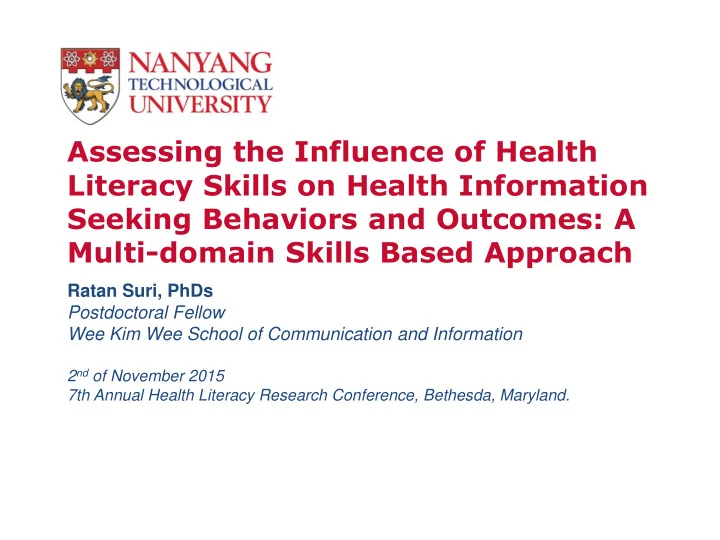

Assessing the Influence of Health Literacy Skills on Health Information Seeking Behaviors and Outcomes: A Multi-domain Skills Based Approach Ratan Suri, PhDs Postdoctoral Fellow Wee Kim Wee School of Communication and Information 2 nd of November 2015 7th Annual Health Literacy Research Conference, Bethesda, Maryland.
Information Literacy and Health Literacy Research Team at NTU Team Members • Ratan Suri, PhD • Shaheen Majid, PhD • Yun-Ke Chang, PhD • Shubert Foo, PhD Project Officer Hannah Dumaual Trinity Xavier
Introduction • Most current measures of health literacy focus on functional health literacy skills. -Ex: TOHFLA, STOHFLA, NVS, REALM. • We used a newly developed domain-specific skill based health literacy measure to access health literacy and its influence on health information seeking and 3 categories of outcomes.
Study Outline Five domain specific skills measured include: Ability to: 1. Find Health Information (FHI) 2. Appraise Health Information (AHI) 3. Understand Health Information to Act (UHI) 4. Actively Manage One`s Health (AMH) And 5. E-health Literacy (e-Heals)
Study Outline The relationship these five domain specific skills were tested on: 1. Health care information seeking from traditional sources and the Internet 2. Health Lifestyle Information seeking from traditional sources and the Internet 3. 3 Outcome Categories: Cognitive outcomes, Instrumental outcomes and doctor-patient communication outcomes
Study Outline 1. A cross sectional survey was implemented ( N =1052) 2. Subjects age ranged between 21 and 45 years 3. 44% male and 56% women took part in the study 4. T-tests and OLC regression were used to analyze the data (two-tailed). 5. Study was approved by NTU IRB
Results Healthcare Information • Ability to Appraise Health Information (AHI) and Ability to Manage one`s Health (AMH) were statistically significantly related to the use of traditional sources for healthcare information (p<0.05) • Ability to Appraise Health Information (AHI) and e-health literacy were statistically significantly related to the use of Internet for healthcare information (p<0.05).
Results Health Lifestyle Information • Ability to Manage one`s Health (AMH) were statistically significantly related to the use of traditional sources for health lifestyle information (p<0.05) • Ability to Manage one`s Health (AMH) and e- health literacy were statistically significantly related to the use of Internet for healthcare information (p<0.05)
Results Outcomes • Cognitive outcomes: FHI, AHI, AMH, and e- health literacy are all statistically significantly related (p<0.05) • Doctor-patient Communication Outcomes : AHI,AMH, and e-health literacy are all statistically significantly related (p<0.05) • Instrumental Outcomes: AFH, AHI, AMH, and e-health literacy are all statistically significantly related (p<0.05)
Limitations of the Study 1. Study conducted on relatively healthy young adults as opposed to clinical populations who may have greater need for seeking health information 2. Variance explained by the models is low: ranging from 15 % to 25% 3. Study conducted only among English speaking population in Singapore 4. Measures are relatively new and need to be validated in more diverse populations to establish their reliability and usefulness.
Health Literacy Research at NTU Questions and suggestions? Corresponding Author Ratandeep Suri Ratnadeep.suri@gmail.com
Recommend
More recommend